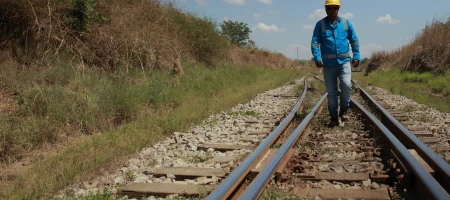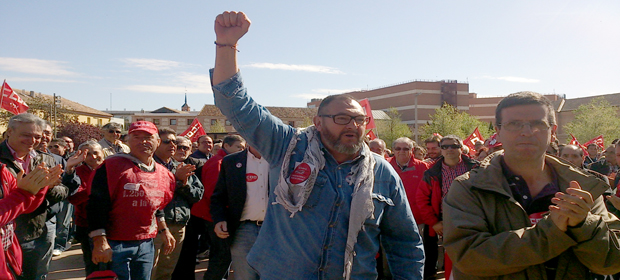
Towards a just energy transition - Experiences from Spain
The impact on workers because of transformations and instability in the coal sector over the last three decades in Spain.
The international agreements ratified by Spain to reduce greenhouse gas emissions and its commitments to the European Union have accelerated the transformation of the energy sector. Faced with the decline of mining, Spain, workers’ unions and companies have been forced to find a consensus that will lead to a just energy transition.
1970 - Increasing jobs due to state protection
The national coal economy in Spain has undergone several rearrangements and different transformations because it is no longer economically viable. This has led to the coal sector suffering from constant instability, creating enormous challenges for workers and mining dependent local economies.
In the 1970s, coal production in Spain enjoyed its best moments thanks to state protection against lower foreign coal prices, as well as because of the increase in oil prices, state policies aimed at incrementing production and productivity in the sector. Electricity companies were encouraged to buy national coal in exchange for other benefits.
1990-2005 Reorganizations causing 82% job cuts
As a result of these protectionist measures, the number of jobs available in the sector increased between 1970 and 1990. However, starting that year, a series of reorganization measures took place, causing sectoral economic reductions, which increased unemployment.
New requirements with the entry of Spain into the European Union affected the sector severely. The reduction of aid programs for mining companies and the measures to reduce coal production ended up causing job cut of 82% between 1990 and 2005. Measures were taken to encourage the development of industries that were capable of absorbing the jobs lost in the sector.
Despite these measures, job relocations and also early retirements were not enough to mitigate the problems of unemployment and economic precariousness. Many new jobs obtained were unstable and of low income.
2013-2018 - European Union pushes for Closure Plan
Due to the pressure exerted by the European Union, the Closure Plan was implemented between 2013 and 2018. It pushed Spain to restructure the coal sector again, which resulted in the total elimination of aid to mining companies and the closure of fifteen of these. Following the decline of the mining sector, the participation of employees in the coal economy went from an approximate 45,000 workers in 1990 to just 2,000 in 2018.
The fall of the coal economy in Spain – rather than it being caused by a change in the energy matrix – was a consequence of the low national competition, the international prices as well as by its low level of productivity. Before an energy transition occurred in Spain, coal was already a very unstable economic sector that impacted workers and their families heavily.
According to the Spanish Electric Network, coal still was the third main source for generating electricity in Spain in 2018. In addition, the closure of the mines had not been accompanied by decarbonization measures for the Spanish economy to reduce the number of coal consumed. The alternative to this situation was to import coal, registering an increase of 57.6% in coal imports between 2018 and 2019.
The Paris Agreement and the European Union commitments
The reduction of coal mining in Spain was a continuous process in the last decades. The Paris Agreement and the obligations Spain has towards the European Union have led Spain to consider a process of decarbonization and energy transition.
Following the commitments of the Paris Agreement aimed at reducing greenhouse gas emissions, the European Union presented the European Green Pact. It functions as a framework of strategies for its member countries (including Spain) to move towards a clean and sustainable economy model by 2050. Within this context, Spain created a national transition plan.
The national energy transition plan
In 2019, the Spanish government approved the Strategic Framework for Energy and Climate. It includes different instruments such as:
- The Law on Climate Change and Energy Transition,
- The National Integrated Energy and Climate Plan (PNIEC) 2021-2030, and
- The Decarbonization Strategy to 2050.
With these instruments, Spain seeks to reduce greenhouse gas emissions by 23% and thus meeting the Paris Agreement objectives and transform its energy matrix.
Just Transition Strategy
In addition, the Just Transition Strategy is part of the Spanish energy transition plan. It aims at minimising the risks the change will generate for local economies dependent on the mining and energy sectors. It also promotes and protects employment of the workers left without work due to the closure of the mines.
Social justice as a key element of transition
Some measures for the protection of employment, introduced by Spain, have accompanied the decline of the coal sector in the country. However, these measures have been insufficient to stop the loss of employment in the mining regions.
The impacts generated by mining closures have made the issue of a just transition an essential element in energy transition policies. The purpose is to mitigate old as well as new socioeconomic and environmental consequences caused by the decarbonization of the economy.
The influence of trade unions in the search for a transition process towards clean and sustainable economies has as references the programmatic agreements after the Kyoto Protocol. El sindicato Unión General de Trabajadores (UGT) and la Confederación Sindical de Comisiones Obreras (CC.OO.) of Spain, participated decisively in the debate around the “Estrategia Nacional sobre el Cambio Climático” and the “Estrategia Nacional sobre el Ahorro y Eficiencia Energética”. They also proposed measures for the technical and academic training of workers and their organizations on climate change and transformation plans that affected the workplace.

ILO just transition guidelines
The International Labour Organization (ILO) has promoted the need to incorporate a just transition in the strategies for the fulfilment of the Paris Agreement. It has offered the member States a framework guide for the just energy transition. In July 2018, the Spanish government signed this document in order to implement the ILO's Just Transition Guidelines. In addition to this, it should be noted that the union movement also played an important role in the ratification of the Paris Agreement. Committed to the fight against climate change, they demanded effective solutions to the problems generated by the transition.
After the change of government in Spain in 2018, there was room for dialogue with unions and mining companies that led to the formation of the “Acuerdo Marco para una Transición Justa de la Minería del Carbón y Desarrollo Sostenible de las Comarcas Mineras para el Periodo 2019-2027”. In addition, Just Transition Agreements were created that operate strategically in the different mining regions in order to face the issues caused by the closures that took place between 2013 and 2018.
The continuous participation of trade unions
Of course, the role of the unions in the transition does not end with the signing of pacts for the transition, but continues with the participation and support in the implementation of strategies and measures by the country and companies.
These strategies include the monitoring of workers in the affected areas and training plans, which must be accompanied by trade union organizations and relocation measures. Likewise, companies and the country should encourage the creation of support plans for the conservation of jobs and alternative projects for the generation of work in the places of influence of the closures. In addition, one of the commitments acquired by the unions is the dissemination of what has been agreed and the monitoring of its compliance.
In the words of the secretary of the CC.OO., Agustín Martín, quoted by IndustriALL Global Union during 2021:
“We are working for the energy transition process, demanding that it be done fairly for the workers and affected territories. We will continue proposing, negotiating and signing agreements to seek new opportunities for those affected. This agreement is the basis for the signatories at all levels (state, regional, provincial, county and local) to seek solutions for workers affected by the closure of coal-fired power plants”.
There is still a long way to go in the Just Energy Transition process in Spain. However, the country's history in the face of the instability of the coal sector can become a framework of experiences from which strategies and measures are projected for a true just transition in favour of the protecting and guaranteeing employment and dignity of the workers in the process that is just beginning in countries like Colombia.
